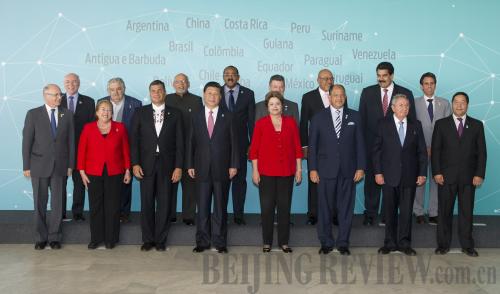|
 |
|
LATIN LINE-UP: Chinese President Xi Jinping (fourth left, front) meets with leaders from Latin American and Caribbean countries on July 17 in Brasilia, capital of Brazil (XINHUA) |
Enhancing cooperation with developing countries, including Latin American and Caribbean nations, has long been a foothold of China's foreign policy.
After attending the Sixth BRICS Summit hosted by Brazil on July 15-16, Chinese President Xi Jinping paid state visit to four Latin American countries—Brazil, Argentina, Venezuela and Cuba—between July 17 and 23, strengthening China-Latin America relations with a host of newly signed deals.
President Xi has been making efforts to build a favorable international environment for China since he took office last year. Through his frequent diplomatic visits, economic ties and common interests with other countries have bolstered and expanded along with China's global political clout. Moreover, Chinese leaders' growing presence in far-flung countries is increasingly important amid the United States' rebalancing to the Asia-Pacific.
China and Latin American countries share many common interests in terms of trade and international politics. In recent years, especially, trade between China and many Latin American states—including Brazil, Argentina and Venezuela—has increased rapidly. Both China and Latin American countries have called on the international community to reform current global governance institutions and establish a fair and rational international political and economic order. As the global economic recovery faces uncertainties, both China and Latin America need to enhance their cooperation in addressing challenges and realize a sustainable and inclusive growth.
Building a mechanism
In Brazil, the Chinese leader's first stop on the Latin American tour, President Xi met with leaders from 11 Latin American and Caribbean countries on July 17. They jointly announced the decision to officially establish a cooperation forum between China and the Community of Latin American and Caribbean States (CELAC) after a China-CELAC leaders' meeting in the Brazilian capital.
In his keynote speech, Xi said, "It has been our shared aspiration to have closer overall cooperation." China and CELAC also agreed to hold the forum's inaugural ministerial meeting in Beijing as soon as possible.
"Within the framework of the forum, China looks forward to increasing dialogue and cooperation with regional and sub-regional organizations and ensuring the success of the China-Caribbean Economic and Trade Cooperation Forum, thus creating a comprehensive and well-designed network for overall development," Xi said.
Wu Hongying, Director of the Institute of Latin American Studies at China Institutes of Contemporary International Relations, told Economic Information Daily that the establishment of the China-CELAC Forum is a crucial step for China and the regional community to set up a comprehensive cooperation mechanism.
This forum models after the current successful dialogue mechanism between China and the Association of Southeast Asian Nations (ASEAN), Wu said. According to Wu, the forum ushers in a new stage of cooperation between China and CELAC. Latin American and Caribbean countries are home to one of the most highly prospective regions in the world economy.
"The forum is just the start for building a cooperative mechanism between China and CELAC," Wu said. "The institution will considerably promote bilateral and multilateral cooperation between China and Latin America."
The establishment of China-CELAC Forum reflects the growing confidence and maturing foreign policies of China in the international arena, said Sun Hongbo, researcher of Latin America at the Chinese Academy of Social Sciences in an interview with Economic Information Daily. As an important regional integration organization, CELAC needs to balance various appeals and interests among its 33 members, which is a key factor for the development of the forum, Sun said.
Additionally, China underscored its sense of international responsibility by offering a number of loans and aid measures to Latin America at the meeting, including a special loan of $10 billion for infrastructure construction, a favorable loan of $10 billion, a $5-billion contribution to a cooperation fund, and $50 million for agriculture projects.
Both China and CELAC should promote people-to-people communication and extend mutual understanding. China will also provide Latin American and Caribbean countries with 6,000 government scholarships within the next five years to promote communication in science and technology, Xinhua News Agency reported.
| 